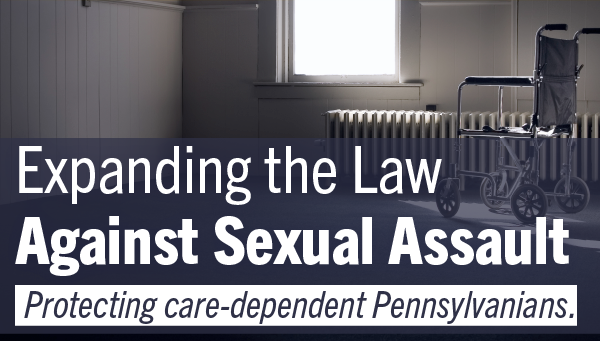
|
|||
|
In this Update:
Mastriano Amendment to Remove Dead Voters from Voter Rolls Passes Senate CommitteeApril 6, 2022 HARRISBURG – Senator Doug Mastriano (PA-33) successfully offered an amendment to ensure timely removal of deceased registered voters from the SURE system. The amendment clearly states that Department of Health must provide notice of a deceased individual to a county election commission within seven days of the individual’s death. Under current statute, the Department of Health can wait up to 60 days to report the decreased individual. The amendment was part of a larger bill co-sponsored by Mastriano and introduced by Senator Aument (SB 1018) that will clean up voter rolls (SURE system) to prevent fraud and abuse. SB 1018 will accomplish the following:
“In 2020 report, the Public Interest Legal Foundation (PILF) provided the Department of State with the names of at least 21,000 deceased registrants who remained on the voter rolls less than a month before the 2020 election,” said Senator Mastriano. “We must avoid this kind of egregious error in the future. My amendment will allow counties to have the most up to date information to ensure registration records are accurate and that all deceased voters are removed from the rolls well before an election.” SB 1018 now advances to the full Senate for consideration. Mastriano has introduced a comprehensive package of election integrity bills this session. This package includes bills that would eliminate mass mail-in voting (SB 884), mandate voter ID for all forms of voting (SB 735), and expand and empower poll watchers (SB 573). Mastriano Votes “Yes” to prevent Pennsylvania’s entry into RGGIHarrisburg- Senator Mastriano (PA-33) provided the following statement after voting to override Governor Wolf’s veto of a Resolution that would have disapproved his carbon tax on Pennsylvanians: “Pennsylvania is an energy powerhouse, but we have the potential to be so much more. We are the nation’s number 3 energy producer, number 3 coal producer, and the number 2 natural gas provider. Not only do we meet our own energy needs, but we also meet the needs of other states who depend on us to keep their own energy grid up and running. “The carbon tax imposed by RGGI will result in immediate job loss across our energy sector. According to the Department of Environmental Protection, all 5-remaining coal-fired electricity plants will be shuttered within a year of enactment. Not only will those workers be out of the job, but so will many of those in the coal production business which feeds into these power plants. “Immediate job loss will not be the only negative impact of RGGI. Like all taxes, the carbon tax will be passed on to consumers in the form of higher electricity rates. As we heard in Senate testimony last week, the Independent Fiscal Office projects consumer energy prices will nearly quadruple. Energy costs in the U.S are already up exponentially compared to last year. Inflation in the economy and now a war in Europe has compounded the struggles of lower and middle-class families. We cannot afford to make high energy costs permanent by entering RGGI. “Lastly, we must examine the context of RGGI in today’s national security circumstances. Oil and gas revenue into the coffers of the Russian government allows them to spend it on weapons and other military equipment. America has indirectly poured billions into Putin’s war chest. A perfect example of this occurred in 2016 during a particularly long cold snap in Boston, Massachusetts. Running out of fuel for energy and desperate for a source, Boston did not turn to Pennsylvania for its natural gas. Instead, they turned to RUSSIA! “One thing is for sure. RGGI will do far more harm than good for Pennsylvanians when you consider the spike in prices to consumers, the job loss in our vulnerable communities, and the foreign policy implications.” The veto override fell short by one vote with nearly every Democrat voting to raise future utility bills for Pennsylvanians. State Court Blocks Gov. Wolf’s $781 Million Carbon Tax Pending Further Order
In a win for Pennsylvania consumers and workers, Pennsylvania Commonwealth Court this week ruled Gov. Tom Wolf’s $781 million carbon tax could not take effect pending a full order from the court. The ruling came a day after Republicans stood united in an attempt to override the governor’s veto of the resolution that disapproves of Pennsylvania joining the Regional Greenhouse Gas Initiative (RGGI). The effort came up one vote short when Democrats voted against the state’s economic interests in favor of a policy that will spike residential electricity bills 30% and kill 22,000 jobs. Just last week, impartial analysis from the Independent Fiscal Office (IFO) concluded RGGI could nearly quadruple new electricity costs for consumers above the administration’s own year-old projections for the program. The IFO also warned members “those costs would be pushed through to final customers.” As for environmental benefits, multiple independent reports show emissions from Pennsylvania’s power sector declined at a comparable rate to the other 10 RGGI states over the last decade. The Wolf Administration is attempting to enter this pact through the regulatory process without the approval of the legislature. Every other participating state entered RGGI through the legislative process – not unilateral executive action. A bipartisan majority of legislators has consistently voted against RGGI when the issue has been brought to the floor for a vote. Senate Votes to Expand Sexual Assault Law to Cover Crimes Against Care-Dependent Pennsylvanians
The Senate voted to expand the law against institutional sexual assault to include assaults by caregivers on care-dependent individuals, closing a loophole that allows perpetrators to escape punishment. Current law against sexual assault applies to institutions such as prisons, schools and law enforcement. It is premised on the fact that truly consensual sexual acts are not possible where someone is in a position of power over another. Passage of Senate Bill 704 recognizes the same power disparity exists between caretakers and those in their care. Such individuals face additional challenges to reporting sexual abuse due to the circumstances that make them dependent upon others, including physical or cognitive disabilities, and mental and physical health struggles. Expanding the law against institutional sexual assault eliminates the loophole that permits perpetrators to falsely claim the victim consented. Senate Bill 704 will be sent to the House of Representatives for consideration. Observing Sexual Assault Awareness Month April is Sexual Assault Awareness Month. Expanding the law against institutional sexual assault is just the latest action taken by the General Assembly to stand together against this vile crime. In recent years, lawmakers enacted measures strengthening the rights of sexual assault survivors and bolstering their ability to obtain justice. Need help? Call 800-656-HOPE (4673) to be connected with a trained staff member from a local sexual assault service provider. Safe Exchange Zones Could Come to More PA Communities with Senate Vote
Legislation to create a grant program to establish Safe Exchange Zones throughout Pennsylvania was approved by the Senate and sent to the House of Representatives for consideration. Senate Bill 881 would provide a safe area for individuals to exchange goods bought and sold through an online marketplace, as well as serving as a safe place for child custody exchanges, among other practices. The Safe Exchange Zones would be voluntary and require the agreement of the participating law enforcement agencies. The zones would be equipped with video surveillance and are either within 100 feet of a law enforcement office or located near a public area with an active public presence. Passage came a year to the day that Cambria County resident Denise Williams was murdered after she attempted to finalize the purchase of an item found through Facebook Marketplace. Grants Available to Help Drug and Alcohol Recovery Houses
Effective treatment for individuals in recovery from a substance use disorder is essential for healthy communities. State grants are available to help recovery houses with facility upgrades to comply with federal, state, and local laws and receive a state license. Grants up to $50,000 for a 12-month period beginning July 1 will be awarded to eligible applicants for health and safety upgrades including demolition, debris removal, rehabilitation improvements, environmental remediation costs, and construction and inspections to comply with state regulations. Applicants must meet several qualifications to be eligible. More information is available here. Saturday is National Former Prisoner of War Recognition Day
It’s commemorated on April 9 because that day in 1942 was the prelude to the Bataan Death March in the Philippines, the forcible transfer by the Imperial Japanese Army of up to 80,000 American and Filipino prisoners of war. Up to 650 American and 10,000 Filipino soldiers died during the brutal, 65-mile march. We must never forget the ordeal faced by prisoners of war during captivity and the emotional toll on those fortunate enough to survive. |
|||
|
|||




Want to change how you receive these emails? 2026 © Senate of Pennsylvania | https://senatormastriano.com | Privacy Policy |





